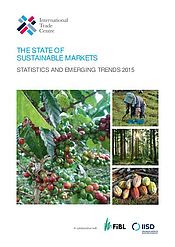The State of Sustainable Markets: Statistics and Emerging Trends 2015

Survey results from 14 sustainability standards across nine commodity areas help determine new statistics and emerging trends for sustainable production
The State of Sustainable Markets: Statistics and Emerging Trends 2015 is the first global data report on fast-growing voluntary sustainability standards. It outlines the share of bananas, cocoa, coffee, cotton, forestry, palm oil, soybeans, cane sugar and tea in 14 major standards.
The report is based on a partnership between the Research Institute of Organic Agriculture (FiBL), the International Institute of Sustainable Development (IISD) and the International Trade Centre (ITC), and is supported by the Swiss State Secretariat for Economic Affairs (SECO).
Certain commodities are seeing a widespread shift towards being produced in more sustainable ways. Palm oil that is certified by the Roundtable on Sustainable Palm Oil, for example, has seen the greatest jump with certified area expanding almost 30 times between 2008-2014. Certified forest area expanded globally by 41% between 2008 and 2014. Since 2008, all standards included in this report have experienced growth in Voluntary Sustainability Standards-compliant areas.
“The purchasing preferences and actions of consumers are increasingly influencing and impacting how goods are produced,” said ITC Executive Director Arancha González. “As consumers are asking for more sustainable products to be available, and greater transparency of value chains, producers are shifting their practices to meet this demand. This new report for the first time collects market data on standards and examines trends to see exactly how sustainable products are penetrating mainstream markets.”
Sustainability standards are seeing their production areas grow as farmers subscribe to their requirements; Rainforest Alliance, a sustainability labelling initiative, has seen their certified area grow nine-fold in only four years.
Other findings also show that India has the highest number of organic producers and also ranked high for sustainable tea growing area. The United States topped the list of countries with the largest market for organic food.
The report includes a wide range of data for independent analysis and offers a snapshot of voluntary sustainability standards and their growing influence over markets. By researching, recording and measuring this growth, the impact of sustainable production is becoming clear and creating opportunities for SMEs to increase their production and access new markets that are demanding more evidence of this sustainable production.
 tap and then scroll down to the Add to Home Screen command.
tap and then scroll down to the Add to Home Screen command.